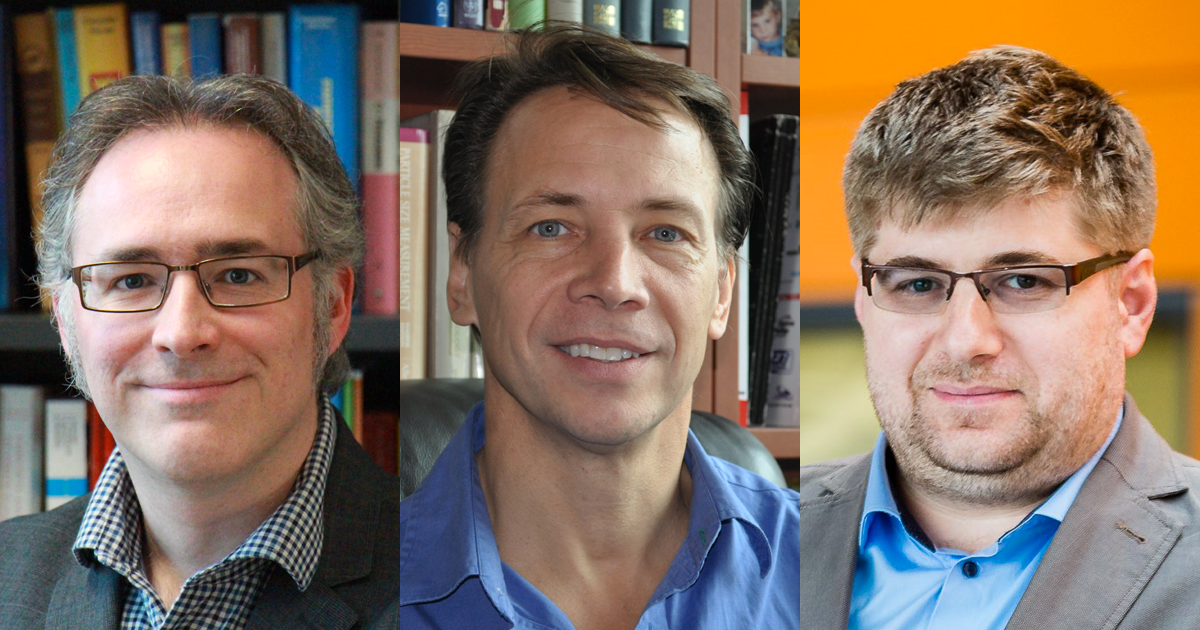Nouvelles
Polytechnique Montréal awarded $2.4 million grant for three chairs as part of the Canada Research Chairs Program
Professors Martin Lévesque, Gregory S. Patience and Denis Seletskiy earn backing for their research work from the Canada Research Chairs Program.
As officially announced by the Honourable Kirsty Duncan, Minister of Science, the federal government, through the Canada Research Chairs Program, is supporting three chairs at Polytechnique Montréal, including two new ones. The government is granting a total of $2.4 million dollars to support research at Polytechnique Montréal.
Minister Duncan announced funding for a total of 176 Canada Research Chairs across the country, at 42 postsecondary teaching institutions. The total amount funded through the program is $145.6 million.
Tier 1 Canada Research Chairs are awarded to “outstanding researchers acknowledged by their peers as world leaders in their fields.” They receive annual funding of $200,000 for seven years and are renewable. Tier 2 Canada Research Chairs are held by “exceptional emerging researchers acknowledged by their peers as having the potential to lead in their field.” These chairs benefit from $100,000 in annual funding over five years, and are renewable one time only.
Following are descriptions of the Polytechnique Montréal research chairs receiving support as part of this government announcement:
Canada Research Chair in Multiscale Modelling of Advanced Aerospace Materials and Processes
Chairholder: Martin Lévesque, Professor, Department of Mechanical Engineering
Type of chair: Tier 2 Chair, renewed
Professor Martin Lévesque’s work is in advanced materials such as high-performance composites and nickel-based superalloys offering outstanding mechanical properties. Among other things, he is interested in surface treatments, such as shot peening, a process that can yield a 20-fold improvement in the life of aerospace components.
Professor Lévesque’s research program focuses on development of accurate predictive models that will enable Canadian engineers to unlock the full potential of existing high-performance materials in designing next-generation aircraft that will be lighter, longer-lasting and safer, and also have a reduced environmental footprint.
The multiscale approach under study predicts onset of damage at the micrometre scale, and tracks its progression up to scales measured in metres, using rigorous physically based models.
Canada Research Chair in High-Temperature, High-Pressure Heterogeneous Catalysis
Chairholder: Gregory S. Patience, Professor, Department of Chemical Engineering
Type of chair: New Tier 1 Chair
The research program headed by Professor Gregory S. Patience aims to develop technology that will recover and process “stranded” methane emitted during pumping of crude oil, replacing the current costly method of treatment.
The innovations emerging from Professor Patience’s research include combining multiple catalytic reactions in a single vessel, operating at temperatures as high as 1,000°C, and reducing the number of steps in the process. Work also involves applications of heterogeneous catalysis on knitted metal fibre containing iron, chromium and alumina.
Professor Patience also seeks to apply this technology to processes requiring highly toxic chemicals, with an eye to producing small volumes of chemical products locally, avoiding the need to transport them by road, rail or water.
Canada Research Chair in Ultrafast and Quantum Photonics
Chairholder: Denis Seletskiy, Assistant Professor, Department of Engineering Physics
Type of chair: New Tier 2 Chair
Professor Denis Seletskiy’s research work aims at developing novel light sources as well as ultrafast analytical methods applicable to quantum phenomena (coupling of light and matter) with dynamics on a timescale of a few femtoseconds (1 femtosecond = 10-15 seconds).
By “unravelling the dynamical interplay of quantum light and quantum matter at their “natural” timescales,” Professor Seletskiy will seek to improve understanding of the intrinsic interactions that influence the macroscopic properties of physical phenomena such as high-temperature superconductivity.
In addition, the ability to manipulate quantum light at very short timescales will allow new high-bandwidth approaches to quantum information and communication.
Congratulations to our professors!

Left to right: Martin Lévesque, Professor, Department of Mechanical Engineering, Polytechnique Montréal; Gregory S. Patience, Professor, Department of Chemical Engineering, Polytechnique Montréal; Denis Seletskiy, Assistant Professor, Department of Engineering Physics, Polytechnique Montréal.
En savoir plus
Expertise profile of professor Martin Lévesque
Expertise profile of professor Gregory S. Patience
Expertise profile of professor Denis Seletskiy
Website of the Department of Mechanical Engineering at Polytechnique Montréal
Website of the Department of Cheminal Engineering at Polytechnique Montréal
Website of the Department of Engineering Physics at Polytechnique Montréal
Website of the Canada Research Chair Program




